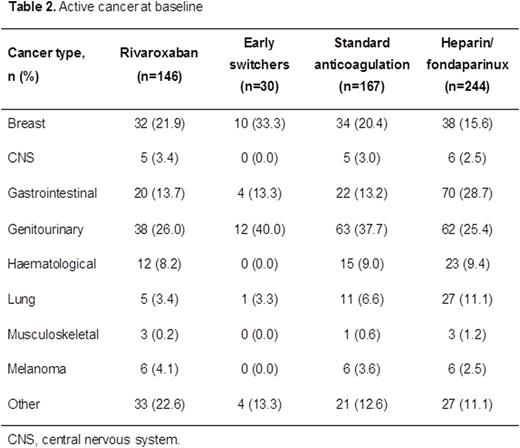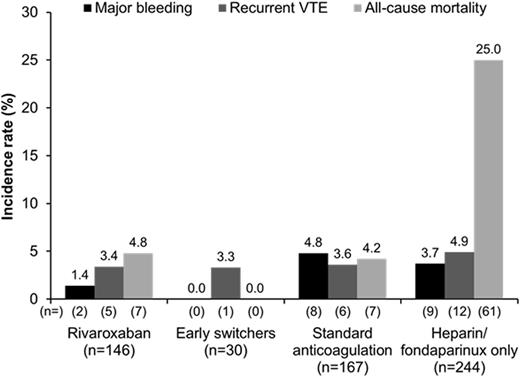Abstract

Background: XALIA is a prospective, non-interventional study of rivaroxaban in the treatment of acute deep vein thrombosis. The overall XALIA results showed that rivaroxaban was associated with similarly low rates of major bleeding and symptomatic recurrent venous thromboembolism (VTE) as standard anticoagulation. A subset of patients in XALIA had active cancer at the time of enrolment into the study.
Purpose: To describe the demographics, clinical characteristics, treatment strategies and outcomes of patients in XALIA with cancer and VTE. The primary outcomes were major bleeding, recurrent VTE and all-cause mortality.
Methods: Patients with deep vein thrombosis with or without concomitant pulmonary embolism aged ≥18 years who had active cancer and were scheduled to receive ≥3 months of anticoagulation with rivaroxaban or standard therapy were eligible. Therapy type, dose and duration were at the physician's discretion. For the purpose of this substudy, we defined the following treatment cohorts: rivaroxaban cohort (patients treated with rivaroxaban alone or who received heparin/fondaparinux for ≤48 hours before switching to rivaroxaban); early switchers cohort (patients treated with rivaroxaban who received heparin/fondaparinux for >48 hours-14 days and/or a vitamin K antagonist [VKA] for 1-14 days before changing to rivaroxaban); standard anticoagulation cohort (patients treated with heparin/fondaparinux and a VKA or a VKA only); and heparin/fondaparinux cohort (patients treated with heparin/fondaparinux alone).
Results: Of 5136 patients in XALIA who received study medication, 587 (11.4%) had active cancer at baseline. Of these, 146 (24.9%) received rivaroxaban, 30 (5.1%) were early switchers, 167 (28.4%) received standard anticoagulation (of which 26 [4.4%] received a VKA only) and 244 (41.6%) received heparin/fondaparinux only, of whom 223 (38.0%) received low molecular weight heparin and the remainder other heparins or fondaparinux. Demographics are shown in Table 1. The most common type of active cancer at baseline in all cohorts was genitourinary, with the exception of the heparin/fondaparinux cohort where gastrointestinal cancer was the most common type (Table 2).
The incidence rates for the primary outcomes for each cohort are shown in Figure 1. The rates of major bleeding were highest in the standard anticoagulation cohort (n=8 [4.8%]) and lowest in the early switchers (no major bleeding events occurred). The rates of recurrent VTE were similar in the in the rivaroxaban, early switcher and standard anticoagulation cohorts (n=5 [3.4%], n=1 [3.3%] and n=6 [3.6%], respectively) and were highest in the heparin/fondaparinux cohort (n=12 [4.9%]). All-cause mortality was highest in the heparin/fondaparinux cohort (n=61 [25.0%]) and lowest in the early switchers (no deaths occurred).
Conclusions: In the real-world XALIA study, 38.0% of patients with cancer received treatment with low molecular weight heparin, which was in line with guidelines. The remaining patients received rivaroxaban, standard anticoagulation or were early switchers. For the three primary outcomes, the lowest incidence rates were observed in the early switcher cohort. The highest rates were in the standard anticoagulation cohort for major bleeding and the heparin/fondaparinux cohort for recurrent VTE and all-cause mortality; rates for all three primary outcomes were low in the rivaroxaban cohort, suggesting that rivaroxaban may be a safe and effective treatment option for patients with VTE and active cancer.
Primary outcomes in patients with active cancer at baseline by treatment group.
VTE, venous thromboembolism.
Primary outcomes in patients with active cancer at baseline by treatment group.
VTE, venous thromboembolism.
Turpie:Janssen Research & Development, LLC: Consultancy, Honoraria; Bayer Pharma AG: Consultancy, Honoraria. Mantovani:Janssen-Cilag Ltd: Research Funding; Boehringer Ingelheim: Research Funding; Daiichi Sankyo: Consultancy; Bayer Pharma AG: Consultancy; Pfizer Inc: Research Funding. Haas:Sanofi SA: Consultancy; Pfizer Inc: Consultancy; Daiichi Sankyo: Consultancy; Bristol-Myers Squibb: Consultancy; Bayer Pharma AG: Consultancy; Aspen Pharmacare: Consultancy. Kreutz:Bayer Pharma AG: Honoraria; Servier Laboratories Ltd: Consultancy; Lundbeck Ltd: Consultancy; Daiichi Sankyo: Consultancy; Berlin-Chemie Menarini: Consultancy; Bayer Pharma AG: Consultancy; Bristol-Myers Squibb: Honoraria; Daiichi Sankyo: Honoraria. Monje:Bayer Pharma AG: Employment. Schneider:Bayer Pharma AG: Employment. van Eickels:Bayer Pharma AG: Employment. Gebel:Bayer Pharma AG: Employment. Ageno:Boehringer Ingelheim: Consultancy, Honoraria; Bristol-Myers Squibb: Consultancy, Honoraria; Bayer Pharmaceuticals: Research Funding; Daiichi Sankyo: Consultancy, Honoraria; Bayer Pharma AG: Consultancy, Honoraria.
Author notes
Asterisk with author names denotes non-ASH members.

This icon denotes a clinically relevant abstract




This feature is available to Subscribers Only
Sign In or Create an Account Close Modal